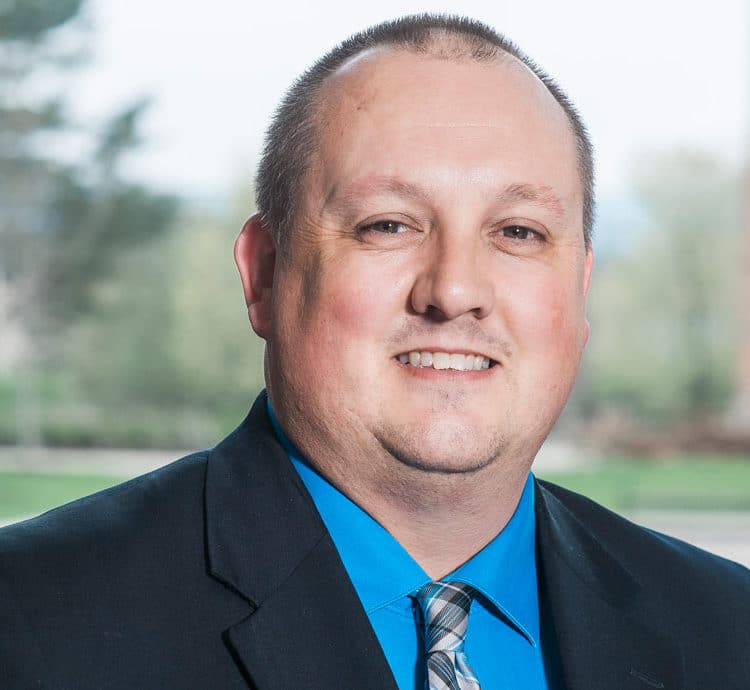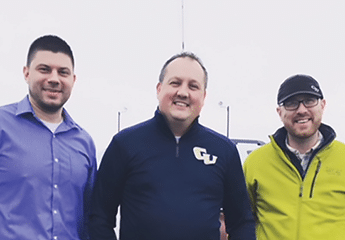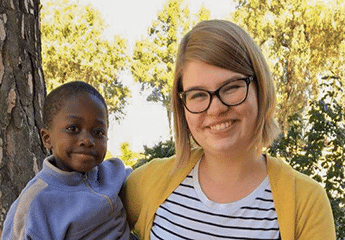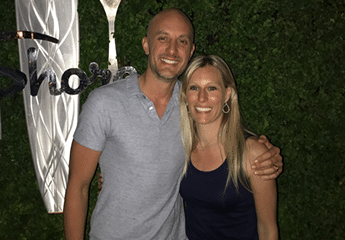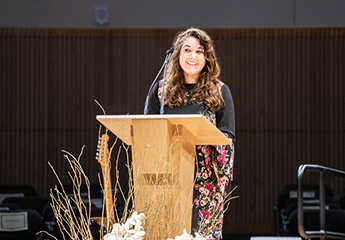If you ask Robyn Afrik (B.S. ’05) why she does the work that she does, she’ll be the first to tell you she didn’t go looking for it. Instead, her work was born out of a story of loss, pain, redemption and a journey toward reconciling it all. Abandoned at birth, adopted into a Dutch West Michigan family and raised as a Korean adoptee, she wrestled early with her own sense of “self,” a culture she represented but wasn’t sure how to express, and a worldview that told her God was color blind.
The twists and turns of her journey led to a career speaking at local and national conferences, conducting workshops and consulting with organizations on diversity, inclusion, international adoption and the nuances of multicultural families. She’s been recognized for advancing the cause of racial equity by the City of Holland and presented at the National Prayer Breakfast on reconciliation. She’s co-founder of Women of Color Who Give, a philanthropic circle for women of color by women of color, and she supports Be the Bridge, which focuses on inspiring Christians to be a bridge toward healing and transformation across racial divides. She is also a contributing author to the book “Becoming Like Creoles: Theology and the Intersections of Injustice, Culture and Religion” by Dr. Rev. Curtiss Paul DeYoung.
“In this season of life,” says Afrik, “I feel called to work in areas that promote sustainable change, encourage transformation and leave a legacy in our communities and beyond. It leads me to places least expected, but to ones my story has uniquely positioned me to address.”
To Afrik, this work is personal, but it’s also bigger than her. It’s important for all of us to recognize that we’re made in God’s image and called “good” by Him.
“For me, I am a woman, a daughter, a Korean, an adoptee, a mother and beyond,” says Afrik. “So how do I then celebrate, live into and share these elements of myself?” And when she recognizes times and seasons when some “images” don’t feel validated, she leans into the importance of reconciling those messages with what God has already established as good. Her work encourages others to do the same.
“This understanding is the key to healing our world, building bridges and loving others as we love ourselves. If we can’t love ourselves, how can we learn to love anyone else? It’s all part of the greater love story—the witness of who God is in the world today.”
My P-A-R-T
Part of Robyn’s work is also addressing collective ways to consider what we can all do. “Sometimes the work of racial reconciliation or building bridges can feel overwhelming,” she says. “There’s questions of, Where do I begin? I often teach this acronym: P.A.R.T.”
We all have a part to play. And we need to ask, “What is my part in this?”
- P—We must give ourselves permission to pursue all the places of our perceptions. Then ask, “How does my power, my privilege and my position affect me—whether I know it or not?”
- A—Consider accountability, then action. How do I hold myself accountable to authenticity before I move into action? If we don’t do this first, we will repeat the same patterns that caused the pain in the first place.
- R—Remember the beautiful gift of reconciliation and come to the table in that identity. Renew your relationships with people, looking beyond their roles to the person.
- T—Get to a space in which you can speak truth to power. In that space, you will transform each other. There’s neutrality there. From that, you build a foundation of trust.
About Robyn
Robyn Afrik (B.S. ’05) holds a Master of Science in Management, Strategy and Leadership from Michigan State University and is a certified cultural intelligence (CQ) facilitator. She’s founder and president of Afrik Advantage, specializing in helping businesses and institutions working in diverse spaces. She’s married to a native West African, has three biracial children and lives in Holland, Mich.
Learn more about Robyn and how the hard work of reconciliation can lead to change and transformation in West Michigan and around the country:
- Be the Bridge.
- Panel discussion at IF:Gathering 2017 National Conference.
- Mars Hill Learning Labs: Racial Reconciliation.





